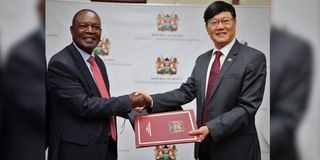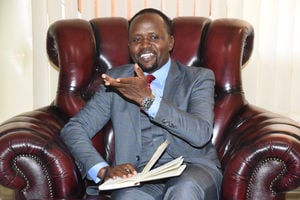
Treasury Cabinet Secretary Njuguna Ndung'u with South Korean Ambassador to Kenya Yeo Sung-Jun during the signing of a Sh980.5 million grant on February 5, 2024 in Nairobi.
Do you know how South Korea became an industrialised country?
Simple. Not really simple as such, but through a wise strategy that on deeper reflection seems obvious .
In the1970s and 1980s, the South Korea government looked around for strategic private sector industries. It identified electronics, ship building, construction and armaments sectors.
The government then made up deliberate efforts to shore up private companies in these sectors through a variety of interventions. These included tax breaks, special loans, reforming its regulatory regime — facilitating ease of doing business, which remains one of the best in the world in enforcing contracts by the World Bank. Also, electricity connection is so easy.
This created a “champion model” economy. This refers to economies where a select few companies are so competitive internationally that they dominate an economy. South Korean Hyundai motor company founded in 1947 by Chung Ju Yung began as a construction firm before flourishing in several other sectors. Samsung and LG deal with electronics.
Incidentally, majority are family-owned businesses. The Lee family of Samsung, the Koos of LG, the Chungs of Hyundai, the Shins of Lottee — they are called the Chaebol . The total sales of the five top family-owned South Korean companies usually make up more than half of the nation’s Gross Domestic Product.
This model has been criticised that it exacerbates inequality. However, its logic is simple. Identify competent private companies, boost them and they internationalise and carry everyone upwards economically.
The rationale for this form of state intervention of “government-to-private sector” will be less costly and more efficient compared with alternative forms of state intervention in economies through “government-to -government entities”.
That’s also the logic in Taiwan. TSMC manufactures semi-conductors microchips that power our phones, computers and several other devices. TSMC dominates the Taiwan economy and is one of the most prized companies in the world due to the enlarged importance of chips in modern economies.
The China and USA feud over Taiwan is primarily over the need to get hold of this prized firm making cutting-edge technology. Forget about alleged rivarly over human rights or uniting motherlands — those are smokescreens and ruses.
Whoever gets these chips dominates the world. And Taiwan leaders were forward-thinking in investing many years ago in supporting TSCM, a private company, to specialise and expand . It is now carrying everyone to prosperity in Taiwan.
This 1970s South Korean and Taiwanese model of supporting strategic private sector companies differs from Kenya’s economic model of the same period.
Kenya decided to channel its money into publicly owned companies — like the various state-owned companies in Western Kenya in the sugar sector or regional bodies like Lake Basin Development Authority.
This strategem had three fundamental errors. First is corruption and incompetence. Government will appoint persons to head these institutions not on the basis of competence but patronage and connections. These persons ran down those institutions and received zero punishment due to their connections in high places.
Second, these companies make decisions based on political logic rather profit. For instance, the price of goods produced by these companies will be hinged on political rather than market sentiment. That makes their products uncompetitive.
Third, inability to adapt to market changes faster compared with theirr private sector competitors.
Resources expended by Kenya into these state-owned companies would have been better employed on education and health and public universities or hospitals would be better resourced as opposed to sinking resources into sectors where government cannot win.
But opportunities are available in Kenya for adoption of the South Korea/Taiwan Champion Model. Many private sector industries show signs of morphing into international giants.
The agro processing sector shows the greatest promise. This is because Kenya remains a largely agriculture based economy which can provide primary industrial materials like raw maize and milk. Kenya is surrounded by food-deficient countries and hence sits on a huge export opportunity, knowing that large international humanitarian missions entities like United Nations require processed food items like fortified flour.
Further, Kenya possesses the industrial knowhow for value addition. I visited two private agro processing companies and was pleasantly surprised.
One based in Kirinyaga and makes maize flour but at times imports 60 per cent of its raw maize from as far Zambia. This is despite maize from small scale farmers in neighbouring Murang’a lacking buyers.
Another company that processes mangoes is based in Kambiti, Murang’a County, but for the longest period it never bought from local farmers. Instead, it sourced mangoes from the Coast by the truckload.
The two companies employ thousands and have invested in state-of-the art machinery in their production.
However, Murang’a County government, without spending a cent, simply signed a Memorandum of Understanding to mobilise farmers to deliver their products to these two companies at a guaranteed price.
The county did not need to buy expensive processing machinery or expose itself to wastage and corruption by establishing a rival processing factory. That money saved was better utilised constructing early childhood education institutions and hospitals.
What if the national government were to target strategic companies like these two and make them regional agro processing champions? Just like LG in South Korea, and TSCM in Taiwan, they would uplift everyone, ratherer than invest billions in a factory that ends up lining the pockets of privileged elites. Common sense must prevail.
- Dr Kang’ata is the Murang’a County Governor; Email [email protected]










